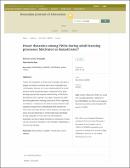| dc.contributor.author | Nuwagaba, Ephraim L. | |
| dc.contributor.author | Rule, Peter N. | |
| dc.date.accessioned | 2022-02-07T09:35:16Z | |
| dc.date.available | 2022-02-07T09:35:16Z | |
| dc.date.issued | 2016-01-12 | |
| dc.identifier.citation | Nuwagaba, Ephraim L., Rule, Peter N. (2015). Power dynamics among PWDs during adult learning processes: motivator or demotivator? | en_US |
| dc.identifier.issn | 2312-9239 | |
| dc.identifier.issn | https://www.ajol.info/index.php/rje/article/view/128012 | |
| dc.identifier.uri | https://kyuspace.kyu.ac.ug/xmlui/handle/20.500.12504/389 | |
| dc.description | 52-65 p. | en_US |
| dc.description.abstract | People with disabilities (PWDs) need knowledge and skills to engage in livelihood activities and to lead meaningful lives. Unfortunately, they are not or are underserved by the formal and non-formal education system. Improving PWDs’ adult learning opportunities requires understanding of the factors that influence their learning. This paper is based on a study that investigated adult learning practices of PWDs regarding microfinance. It focuses on the kinds of power dynamics that operated among (PWDs) and between them and the non-PWDs and how these affected PWDs’ learning. We argue that power and powerlessness is not homogenously distributed among categories of PWDs and that representation, leadership, decision-making and status as measures of power can be a source of motivation or de-motivation, depending on how they are handled. | en_US |
| dc.language.iso | en | en_US |
| dc.publisher | AJOL: Rwandan Journal of Education | en_US |
| dc.relation.ispartofseries | Vol.3;No.1 | |
| dc.subject | Adult learning | en_US |
| dc.subject | Disability | en_US |
| dc.subject | Microfinance | en_US |
| dc.subject | Power relation | en_US |
| dc.title | Power dynamics among PWDs during adult learning processes: motivator or demotivator? | en_US |
| dc.type | Article | en_US |

